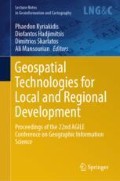Abstract
Technological advances require continuous efforts to keep existing curricula up-to-date and graduates employable in the Earth observation (EO) and geoinformation (GI) sectors. The increasing availability of space/geospatial data and the maturity of technology induce disruptive changes to workflows in the EO/GI sector that suggest the development of training programmes and academic courses for re-skilling of workforce and training new user groups. The target in the EO domain in this respect is to facilitate the ‘user uptake’ of the space infrastructure. User uptake requires knowledge of the workforce demand on the market as well as a skills strategy that takes potential emerging and disruptive changes in the sector into account. In the present contribution we build upon a study of demand for current workforce on the EO/GI market and occupational profiles that require priority when developing training programmes and curricula. Reflections on the findings of that study highlight the need to illustrate expected changes of workflows, i.e. the sequence of tasks executed by employees with a certain occupational profile, for an improved basis of discussion. Therefore, we present a methodology to first, acquire current occupational profiles and second, to illustrate sector developments by mapping the developments on tasks of the workflow. This methodology is demonstrated for the profile of remote sensing specialists. The illustration of changing tasks suggests scenarios for future workforce and questions and directions for the development of a sector skills strategy.
Access this chapter
Tax calculation will be finalised at checkout
Purchases are for personal use only
Notes
- 1.
The geographical distribution of collected responses is available here (January 2019): https://public.tableau.com/views/EO4GEO_Demand_Survey_Part1_Overview_FA/MapDashboard?:embed=y&:display_count=yes&publish=yes.
References
Aguilar Moreno E, Hofer B, Lang S (2018) D 1.2—workshop on demand for space/geospatial education and training. Deliverable of ERASMUS + Project EO4GEO—towards an innovative strategy for skills development and capacity building in the space geoinformation sector supporting Copernicus user uptake. http://www.eo4geo.eu/publications/
Cedefop (2013) Quantifying skill needs in Europe. Occupational skills profiles: methodology and application. European Centre for the Development of Vocational Training, Luxembourg
Cedefop (2014) Terminology of European education and training policy: a selection of 130 terms, 2nd edn. Publications Office, Luxembourg
Chen J, Dowman I, Li S, Li Z, Madden M, Mills J, Paparoditis N, Rottensteiner F, Sester M, Toth C, Trinder J, Heipke C (2016) Information from imagery: ISPRS scientific vision and research agenda. ISPRS J Photogramm Remote Sens 115:3–21
Collum J (1999) Analyse von Berufen mit dem DACUM-Prozess. Panorama - Fachinformation für Berufsbildung, Berufsberatung und Arbeitsmarkt, p 1
Committee on Forecasting Future Disruptive Technologies (2010) Persistent forecasting of disruptive technologies. The National Academies Press
European Commission (2016) Copernicus. Market report. Publications Office of the European Union, Luxembourg
Guo H (2017) Big Earth data: a new frontier in Earth and information sciences. Big Earth Data 1(1–2):4–20
Hofer B, d’Oleire Oltmanns S, Ferber N, Albrecht F, Lang S (2018) D 1.3—demand for space/geospatial education and training and priority occupational profiles. Deliverable of ERASMUS + Project EO4GEO—towards an innovative strategy for skills development and capacity building in the space geoinformation sector supporting Copernicus user uptake. http://www.eo4geo.eu/publications/
Johnson J (2010) What GIS technicians do: a synthesis of DACUM job analyses. J Urban Reg Inf Syst Assoc 22(2):31–40
Kunz R (2015) Wissen und Handeln in Schlüsselsituationen der Sozialen Arbeit - Empirische und Theoretische Grundlegung eines neuen kausistischen Ansatzes. Unpublished Ph.D., Universität Basel, Basel
Lang S, Baraldi A, Tiede D, Hay G, Blaschke T (2018) Towards a GEOBIA 2.0 manifesto? Achievements and open challenges in information & knowledge extraction from big Earth data. In: Paper presented to the GEOBIA 2018—from pixels to ecosystems and global sustainability, Montpellier, France
Li S, Dragicevic S, Castro FA, Sester M, Winter S, Coltekin A, Pettit C, Jiang B, Haworth J, Stein A, Cheng T (2016) Geospatial big data handling theory and methods: a review and research challenges. ISPRS J Photogramm Remote Sens 115:119–133
Norton RE (1997) DACUM handbook, 2 edn. Center on Education and Training for Employment, College of Education, The Ohio State University, Columbus, Ohio
O’Sullivan C, Wise N, Mathieu P-P (2018) The changing landscape of geospatial information markets. In: Mathieu P-P, Aubrecht C (eds) Earth observation open science and innovation. Springer International Publishing, Cham, pp 3–23
Sudmanns M, Lang S, Tiede D (2018) Big earth data: from data to information. GI_Forum 2018(1):184–193
Tippelt R, Edelmann D (2007) DACUM (developing a curriculum). In: Erpenbeck J, von Rosenstiel L (eds.) Handbuch Kompetenzmessung. Erkennen, Verstehen und Bewerten von Kompetenzen in der betrieblichen, pädagogischen und psychologischen Praxis. Schäffer-Poesche, Stuttgart, pp 737–757
Wallentin G, Hofer B, Traun C (2015) Assessment of workforce demands to shape GIS&T education. Trans GIS 19(3):439–454
Acknowledgements
We kindly acknowledge the participation of the following remote sensing specialists in the DACUM workshop and their support of this work: Sebastian d’Oleire-Oltmanns, Kerstin Kulessa, Gina Schwendemann and Thomas Strasser. We also acknowledge the input received from Peter Zeil during the development of the presented material. Comments by anonymous reviewers improved the content of the paper. This work has partially been supported by the Erasmus + Sector Skills Alliance project EO4GEO.
Author information
Authors and Affiliations
Corresponding author
Editor information
Editors and Affiliations
Rights and permissions
Copyright information
© 2020 Springer Nature Switzerland AG
About this paper
Cite this paper
Hofer, B., Lang, S., Ferber, N. (2020). Future Occupational Profiles in Earth Observation and Geoinformation—Scenarios Resulting from Changing Workflows. In: Kyriakidis, P., Hadjimitsis, D., Skarlatos, D., Mansourian, A. (eds) Geospatial Technologies for Local and Regional Development. AGILE 2019. Lecture Notes in Geoinformation and Cartography. Springer, Cham. https://doi.org/10.1007/978-3-030-14745-7_19
Download citation
DOI: https://doi.org/10.1007/978-3-030-14745-7_19
Published:
Publisher Name: Springer, Cham
Print ISBN: 978-3-030-14744-0
Online ISBN: 978-3-030-14745-7
eBook Packages: Earth and Environmental ScienceEarth and Environmental Science (R0)

